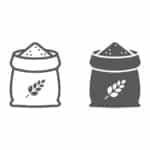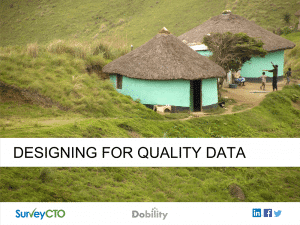Guest Author:
- Roshni Khincha, Data Coordinator
The first user-created additions to SurveyCTO’s template gallery are here! Check out workflows for household surveys, agriculture and more
The Hub is getting better than ever this month. SurveyCTO is pleased to announce that brand new, easily-deployed data collection templates have landed in the Hub. These new templates are courtesy of long-time, expert SurveyCTO user DIME, the World Bank‘s Development Impact department.
DIME aims to transform policy in international development through their work. Their customized data ecosystems have been used to produce actionable insights and inform policy decisions all over the world. Their work is based on a co-production model that works with partners to scale up successful policy instruments.
The DIME Analytics team within DIME takes advantage of the concentration and scale of research at DIME to develop and test resources to enable high-quality, reproducible research.
DIME Analytics previously shared their popular SurveyCTO style guide with us. In 2022, they hosted a webinar on high-frequency check dashboards. Recently, they published a set of SurveyCTO best practices as part of their isurveykit resource.
We know users will again benefit from their commitment to high-quality data collection practices with these new Hub templates.
What are data collection templates?
Templates allow users to adopt a standardized workflow from a different team. The DIME templates fit the use case of impact evaluations, or other multi-module household surveys designed for quantitative research purposes. Templates can be customized to fit your work, and can also be used as a tool for hands-on training.
DIME templates for the Hub

All of the DIME templates in the Hub were created for the DIME Off-the-Shelf Survey Modules Library. A part of the iesurveykit package, this is a library of downloadable data collection templates, each for a specific survey module. These survey modules are designed based on the best practices DIME has developed through their extensive experience in impact evaluation and survey research. Use these tried-and-tested templates as starting points and building blocks when developing your own questionnaires for high-quality data collection. As with all items in the Hub, these templates are here to save survey design teams valuable time and standardize your data collection practices.
To discover DIME’s templates, navigate to the Discover tab in your server console. You will find the Hub template gallery, where you can search for templates that have [World Bank] appended to the end of their title. We are pleased to offer five different templates from DIME in this addition to the Hub.
Household Roster

Household rosters are foundational for many types of projects, since they are usually used to determine eligibility for following surveys. This standardized and adaptable roster module is designed to identify the number of members per household and gather basic data about them such as the number of dependents, gender, education, and employment of household members.
Link to Household Roster template
Food Security

This template can be used to determine if a household or person lacks regular access to the essential necessity of adequate, nutritious food. The questions are designed to meet the criteria of both The Food Consumption Score (FCS) from the World Food Programme, and The Food Insecurity Experience Scale (FIES) by The Food and Agriculture Organizations of the United Nations, which are the 2 standard modules used worldwide for collecting food security data. You can, of course, customize this template to evaluate for only one of these standard modules.
Consumption Expenditure

Use this template to measure household consumption and spending on food and other essentials, like work tools and toiletries, within a given time frame. Besides the survey module, this Workflow comes with attached, preloaded lists of common expenditures.
Assets

Use this template to gather data on a wide variety of possible household assets, from livestock to home appliances.
Agriculture

The Agricultural module is for collecting information on farmers’ use of agricultural inputs. These questions are drawn from previous DIME surveys and have been extensively tested in the field in Rwanda and Mozambique. You get a “bonus” with this Workflow, because DIME has provided two versions of the survey that use the same inputs–one that gathers data by season, and another by season and by plot. In the Hub, you can simply deploy both of these related Workflows simultaneously.
Things to note: All DIME-created Hub templates have SurveyCTO’s enumerator management functionality built into them, to make it easy to keep data linked to the person who collected it. If you do deploy and use any of DIME’s Hub templates, you can also visit its corresponding tab in the module library and find its Implementation Guidelines, which give detailed instructions on deploying and using each template. Remember, like all Hub templates, these modules can be edited to fit an array of use cases.
There’s never been a better time to check out the Hub
With the addition of new templates from the World Bank, now is the time to explore how Workflows in the Hub feature can streamline your work. In the Hub, you can easily deploy complex Workflows and survey templates with a few simple clicks! Hub Workflows that use multiple forms and server datasets come with preloading and dataset publishing already set up and ready to go, making complex data collection flows easier than ever. All Hub templates are fully customizable, meaning they are meant to be edited to meet the needs of a wide variety of projects. They’re also fantastic tools for training teams, especially on more advanced SurveyCTO features.
Have any questions about the Hub? You’re invited to contact sales so that we can help get you up and running.
Do you create data collection Workflows using SurveyCTO? We want to hear from you!
As you might have guessed from this blog post, these contributions from DIME are the first user-generated resources in the Hub–but they won’t be the last. If you have tried-and-true SurveyCTO Workflows that can help new data collection teams get started faster, improve their data quality, and learn the platform, we invite you to click the link below and get in touch with our customer success team.
SurveyCTO is a mobile data collection platform designed to fit a wide range of use cases, from monitoring & evaluation to international development impact evaluations to global digital health, agriculture, education, and more. We welcome Workflow contributions across many industries and applications, and are always curious to learn new ways in which someone might be using our tool. We also frequently collaborate with users on webinars and blog posts, and we’re always happy to hear from SurveyCTO users who want to share their skills and resources with other users. Have a template to share? Get in touch at hub@surveycto.com.




